【精品】Unit2 story time(练习及解析)-译林版(三起)-五年级英语下册(喜子的商铺)
Unit2 Story time(练习及解析)_译林版(三起)六年级英语下册

Unit2 Story time(练习及解析)_译林版(三起)六年级英语下册与当今“教师”一称最接近的“老师”概念,最早也要追溯至宋元时期。
金代元好问《示侄孙伯安》诗云:“伯安入小学,颖悟非凡貌,属句有夙性,说字惊老师。
”于是看,宋元时期小学教师被称为“老师”有案可稽。
清代称主考官也为“老师”,而一般学堂里的先生则称为“教师”或“教习”。
可见,“教师”一说是比较晚的事了。
如今体会,“教师”的含义比之“老师”一说,具有资历和学识程度上较低一些的差别。
辛亥革命后,教师与其他官员一样依法令任命,故又称“教师”为“教员”。
(练习)译林版(三起)其实,任何一门学科都离不开死记硬背,关键是记忆有技巧,“死记”之后会“活用”。
不记住那些基础知识,怎么会向高层次进军?尤其是语文学科涉猎的范围很广,要真正提高学生的写作水平,单靠分析文章的写作技巧是远远不够的,必须从基础知识抓起,每天挤一点时间让学生“死记”名篇佳句、名言警句,以及丰富的词语、新颖的材料等。
这样,就会在有限的时间、空间里给学生的脑海里注入无限的内容。
日积月累,积少成多,从而收到水滴石穿,绳锯木断的功效。
六年级英语下唐宋或更早之前,针对“经学”“律学”“算学”和“书学”各科目,其相应传授者称为“博士”,这与当今“博士”含义已经相去甚远。
而对那些特别讲授“武事”或讲解“经籍”者,又称“讲师”。
“教授”和“助教”均原为学官称谓。
前者始于宋,乃“宗学”“律学”“医学”“武学”等科目的讲授者;而后者则于西晋武帝时代即已设立了,主要协助国子、博士培养生徒。
“助教”在古代不仅要作入流的学问,其教书育人的职责也十分明晰。
唐代国子学、太学等所设之“助教”一席,也是当朝打眼的学官。
至明清两代,只设国子监(国子学)一科的“助教”,其身价不谓显赫,也称得上朝廷要员。
至此,无论是“博士”“讲师”,还是“教授”“助教”,其今日教师应具有的基本概念都具有了。
一、翻译词组。
1.许多好习惯____________________2.一些坏习惯____________________3.起床早____________________4.睡觉迟____________________5.刷牙____________________6.在睡觉前____________________7.把东西整理得井井有条____________________ 8.完成作业________________9.听老师讲____________________ 10.做得好____________________11.昨夜____________________ 12.保持房间的干净整齐_______________13.感到困倦____________________ 14.对……很了解____________________二、看图完成对话。
【教育资料】Unit 2 1.Story time(练习及解析)_译林版(三起)四年级英语上册学习专用

【精品】Unit 2 1.Story time (练习)译林版(三起)一、听录音,找出与句子相符的中文。
( ) 1. A. 你喜欢玩具熊吗? B. 你有一些玩具熊吗?( ) 2. A. 这些是苹果。
B. 它们是苹果。
( ) 3. A. 让我们制作水果沙拉吧。
B. 让我们制作蛋糕吧。
( ) 4. A. 你有一些芒果。
B. 你有一些芒果吗?( ) 5. A. 你有多少个玩具老虎? B. 你有多少个玩具狗?二、连线。
1.2.3.4.三、看图选择合适的对话,将序号填入对应的括号内。
6.四、选择填空。
) 1.Do you have an A. banana B. grape C. orange( ) 2. Wang Bing, do you have grapes? —No, I don’t.a. a pineappleb. a mangoc. a graped. a banana B:Thanks. B:Great!A:Look at our fruit salad. B:How nice! E A:Wang Bing, do you have a banana? B:Yes, I do. A:I have a pineapple. B:I have a mango and an orange. F A:Do you have any bananas, Yang Ling? B:No, I don ’t. I have some grapes.A. someB. anyC. a( ) 3. Let’s have a cake a cherry.A. withB. onC. in( ) 4. Look at my fruit salad! —.A. No, thanks.B. How nice!C. It’s cute and fat.( ) 5. How many do you have? —I have two.A. toy dogB. toys dogC. toy dogs答案及解析:一、A A B A B听力稿:1.2.Do you like toy bears?3.These are apples.二、1.c 2.d 3.b 4.a三、1.D 2.F 3.E 4.A 5.B 6.C四、C B A B B解析:1.2.三个选项中只有orange前面可以用an.3.4.grapes是复数,而且在一般疑问句中some要变成any.5.How many后面要跟名词复数,toy dog是一个整体,复数s在dog的后面加。
Unit2 Cartoon time(练习及解析)_译林版(三起)五年级英语下册-经典教学教辅文档

【精品】Unit 2 How do you come to school ? Cartoon time(练习)译林版(三起)五年级英语下一、翻译词组。
1.在公园里_______________2.太年幼了_______________3.骑自行车_______________4.想要_______________5.把......给......看_______________6.不这样认为_______________7.坐在篮子里_______________ 8.一辆新的自行车_______________9.去上学_______________ 10.不开心_______________二、看图补全对话。
1.Bobby has a _________________ . He likes___________ it in the park.Bobby: This bike is __________! I can __________ now !2.Bobby wants to ________ his bike ________Sam.Bobby: Dad , can I go to school _________ ___________ ? Bobby’s Dad: No, you _____________.Bobby: ___________?Bobby’s dad: Because you’re __________ _____________. 3.Bobby is not _____________.Bobby’s d ad: _______ does Sam go to school ?Bobby : He goes to school _________ _________.4.Bobby’s dad does not________ so.Bobby’s dad: Really?Bobby : Yes, but healways _______ _________ the basket.三、浏览短文,判断以下句子能否正确,正确写“T”,错误写“F”。
【精品】unit2 fun time , sound time song time(练习及解析)-译林版(三起)-五年级英语下册(喜子的商
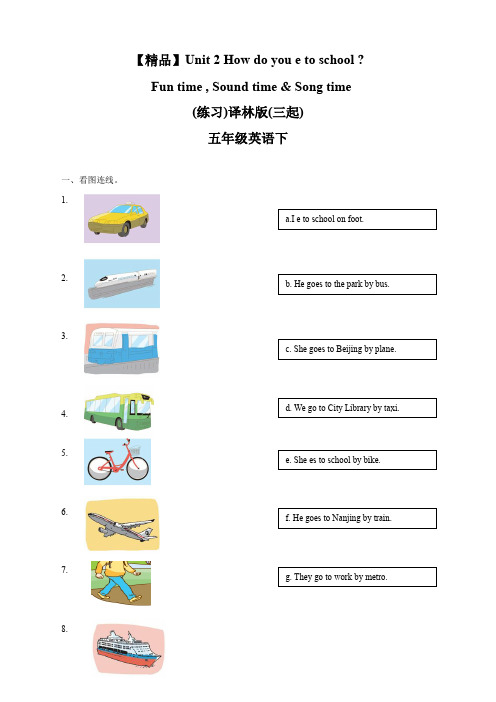
【精品】Unit 2 How do you e to school ?Fun time , Sound time & Song time(练习)译林版(三起)五年级英语下一、看图连线。
1.2.3.4.5.6.7.8. a.I e to school on foot.b. He goes to the park by bus.c. She goes to Beijing by plane.d. We go to City Library by taxi.e. She es to school by bike.f. He goes to Nanjing by train.g. They go to work by metro.h. She goes to work by ship.二、根据要求改写句子。
1. Helen rides a bike to school.(改为同义句)Helen goes to school _________ _________.__________does Yang Ling’s father______to work?3.They live near City Library.(对划线部分提问)__________ __________they live?4. He lives on Garden Street.(改为一般疑问句并做肯定回答)_________ he________on Garden Street?_________, he ________.5. They go there by bus.( 改为一般疑问句并做否定回答)_________, they ________.6.The boys have some oranges. (改成单数形式)The _________ _________ ________ orange.7. There are three houses in the park. (对划线部分提问)__________ _________ houses are there in the park?8. This woman lives on Moon street.(改复数句)_________ _________ on Moon street.三、阅读理解,选择正确的答案。
Unit2 Story time(练习及解析)-译林版(三起)-四年级英语下

【精品】Unit 2 After school Story time(练习)译林版(三起)四年级英语下一、听录音,根据所听内容判断下列句子是否与所给情景相符,相符的写“T”不相符的写“F”。
( ) 1. 初次见到对方,你可以说:( ) 2. 告诉对方,你今天没有体育课,可以说:( ) 3. 询问对方今天早上有什么课,可以说:( ) 4. 询问对方今天星期几,可以说:( ) 5. 告诉对方多遗憾啊,可以说:( ) 6. 询问苏海怎么样,可以说:二、看图完成对话。
Liu Tao: Hi, Mike. Let’s _________ and ________ table tennis.Mike: What _________ is it today?Liu Tao: It’s Wednesday.Mike: Sorry, I _______ a football _________ today.Liu Tao: Hi, Su Hai. _______ and _______ table tennis.Su Hai: Sorry, I have a ___________ __________.Liu Tao: What ________ Su Yang?Su Yang: She _______ a swimming lesson ________.Liu Tao: What a pity!Su Hai: What _______ Saturday?We _____ have _______ lessons _______ Saturday? Liu Tao: All right.三、从II中选出与I栏相匹配的选项。
I II ( ) 1. What day is it today? A. All right.( ) 2. How much is it? B. It’s seven o’clock.( ) 3. What about Su Yang? C. It’s Wednesday.( ) 4. What time is it? D. Yes, it is.( ) 5. What about Saturday? E. She has a swimming lesson too.( ) 6. Is it Wednesday today? F. It’s twenty yu an.答案及解析:一、T F T F T F听力稿:1. Nice to see you.2. I don’t have any lessons today.3. What lessons do you have this morning?4. It’s Sunday.二、1. go play day have match2. Come play swimming lesson3. about has too4. about don’t any on三、C F E B A D解析:1. What day is it today?意思是今天星期几?应回答星期类单词,It’s Wednesday.意思是星期。
Unit2 Story time(教学设计)五年级英语上册(译林版三起)

Unit2 A new student Story time2.Pre-reading:(1) Let’s learn.看图学单词:Classroom 教室music room 音乐室art room 美术室computer room 计算机室playground 操场Library 图书馆(2) Read and say.(3) Think and guess.2.While-reading:Q: Where is their classroom?(6)Read and find.阅读Story time第3-4图,并划一划,找一找。
Q:How does Yang Ling show Nancy around?(7)Read and fill.读Story time第3-4图,找一找,圈一圈。
(8)Read and choose.Part4:Imitate and act.音视频辅助教学,鼓励学生跟读故事和表演故事。
3.Post-reading:(1) Listen and imitate.(1)通过“看”和“听”来进一步模仿故事的语言表达。
同时借助动画的整体性深入化体验,能为学生的自主理解性合作表演提供一定的借鉴。
Part5:Retell and help.复述故事并思考回答。
3.Post-reading:(2) Retell the story.请同学们四人一组,合作完成故事复述。
(3) Let’s help.帮助Nancy来介绍她的新学校吧。
(2)通过故事复述,进一步帮助学生理解故事,同时提升其语言能力,优化表达体验。
(3)在故事学习后,通过帮助Nancy介绍新学校的语篇填空来进一步巩固所学的内容,做到及时复习和强化,提升学习效果。
板书设计:Unit 2 A new student (Story time)。
Unit2 Story time (练习及解析)_译林版(三起)六年级英语上册

Unit2 Story time (练习及解析)_译林版(三起)六年级英语上册这个工作可让学生分组负责收集整理,登在小黑板上,每周一换。
要求学生抽空抄录并且阅读成诵。
其目的在于扩大学生的知识面,引导学生关注社会,热爱生活,所以内容要尽量广泛一些,可以分为人生、价值、理想、学习、成长、责任、友谊、爱心、探索、环保等多方面。
如此下去,除假期外,一年便可以积累40多则材料。
如果学生的脑海里有了众多的鲜活生动的材料,写起文章来还用乱翻参考书吗? 译林版(三起)-六年级英语上册与当今“教师”一称最接近的“老师”概念,最早也要追溯至宋元时期。
金代元好问《示侄孙伯安》诗云:“伯安入小学,颖悟非凡貌,属句有夙性,说字惊老师。
”于是看,宋元时期小学教师被称为“老师”有案可稽。
清代称主考官也为“老师”,而一般学堂里的先生则称为“教师”或“教习”。
可见,“教师”一说是比较晚的事了。
如今体会,“教师”的含义比之“老师”一说,具有资历和学识程度上较低一些的差别。
辛亥革命后,教师与其他官员一样依法令任命,故又称“教师”为“教员”。
一、翻译词组。
“教书先生”恐怕是市井百姓最为熟悉的一种称呼,从最初的门馆、私塾到晚清的学堂,“教书先生”那一行当怎么说也算是让国人景仰甚或敬畏的一种社会职业。
只是更早的“先生”概念并非源于教书,最初出现的“先生”一词也并非有传授知识那般的含义。
《孟子》中的“先生何为出此言也?”;《论语》中的“有酒食,先生馔”;《国策》中的“先生坐,何至于此?”等等,均指“先生”为父兄或有学问、有德行的长辈。
其实《国策》中本身就有“先生长者,有德之称”的说法。
可见“先生”之原意非真正的“教师”之意,倒是与当今“先生”的称呼更接近。
看来,“先生”之本源含义在于礼貌和尊称,并非具学问者的专称。
称“老师”为“先生”的记载,首见于《礼记?曲礼》,有“从于先生,不越礼而与人言”,其中之“先生”意为“年长、资深之传授知识者”,与教师、老师之意基本一致。
牛津译林版四年级英语下册 【精品】Unit2 Story time(练习及解析).doc

【精品】Unit 2 After school Story time(练习)译林版(三起)四年级英语下一、听录音,根据所听内容判断下列句子是否与所给情景相符,相符的写“T”不相符的写“F”。
( ) 1. 初次见到对方,你可以说:( ) 2. 告诉对方,你今天没有体育课,可以说:( ) 3. 询问对方今天早上有什么课,可以说:( ) 4. 询问对方今天星期几,可以说:( ) 5. 告诉对方多遗憾啊,可以说:( ) 6. 询问苏海怎么样,可以说:二、看图完成对话。
Liu Tao: Hi, Mike. Let’s _________ and ________ table tennis.Mike: What _________ is it today?Liu Tao: It’s Wednesday.Mike: Sorry, I _______ a football _________ today.Liu Tao: Hi, Su Hai. _______ and _______ table tennis.Su Hai: Sorry, I have a ___________ __________.Liu Tao: What ________ Su Yang?Su Yang: She _______ a swimming lesson ________.Liu Tao: What a pity!Su Hai: What _______ Saturday?We _____ have _______ lessons _______ Saturday? Liu Tao: All right.三、从II中选出与I栏相匹配的选项。
I II ( ) 1. What day is it today? A. All right.( ) 2. How much is it? B. It’s seven o’clock.( ) 3. What about Su Yang? C. It’s Wednesday.( ) 4. What time is it? D. Yes, it is.( ) 5. What about Saturday? E. She has a swimming lesson too.( ) 6. Is it Wednesday today? F. It’s twenty yu an.答案及解析:一、T F T F T F听力稿:1. Nice to see you.2. I don’t have any lessons today.3. What lessons do you have this morning?4. It’s Sunday.二、1. go play day have match2. Come play swimming lesson3. about has too4. about don’t any on三、C F E B A D解析:1. What day is it today?意思是今天星期几?应回答星期类单词,It’s Wednesday.意思是星期。
【精品】Unit2 story time(练习及解析)-译林版(三起)-五年级英语下册(喜子的商铺)

【精品】Unit 2 How do you e to school ? Story time(练习)译林版(三起)五年级英语下一、翻译词组和句子。
1.非常喜欢______________2.离……远_____________3.在月亮街______________4.在市图书馆___________5.在阳光小镇____________6.在公园街_____________7.乘公交车______________ 8.乘地铁_______________9.乘出租车______________ 10步行________________11.骑自行车_____________ 12.乘飞机______________13.乘火车_______________ 14.乘轮船______________15.你怎样来学校?___________________________________16.你住在哪里?___________________________________17.我的爸爸是一位出租车司机。
___________________________________18.你喜欢你的新家吗?___________________________________二、看图补全对话。
Yang Ling: Do you like your _______ ________, Su Hai ?Su Hai: Yes! It’s very big. I like it very much, but it’s ________ __________ school.Yang Ling: _________ do you live now?Su Hai: I _______ ________Moon Street, _________ City Library.Yang Ling: _________ do you e to school ?Su Hai: Su Yang and I e to school _________ __________.Mike: ______ do you live, Yang Ling? ________ do you e to school ?Yang Ling: I _______ _________school. I e to school ________ ________.Where do you live?Mike: I ________ ________Sunshine Town. I e to school _________ ___________. What about you , Liu Tao?Liu Tao: I _______ ________Park Street. I e to school ________ ________.My father is a _________ __________.三、单项选择。
译林小学英语五年级下Unit2 How do you come to school (Story time)课后练习和参考答案
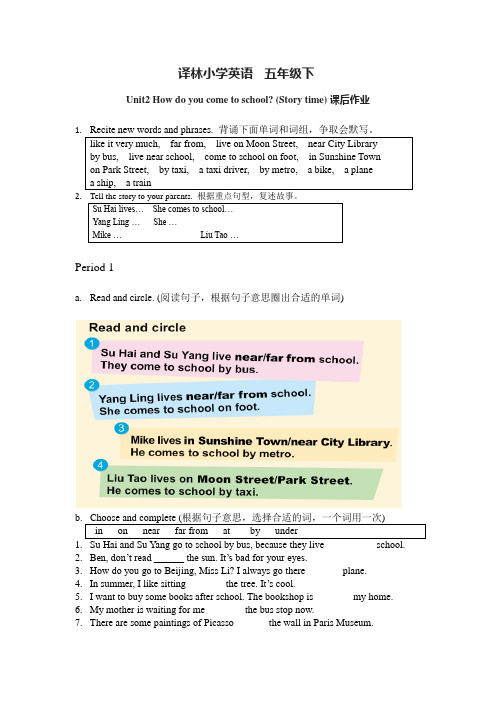
译林小学英语五年级下Unit2 How do you come to school? (Story time) 课后作业1.2.Period 1a.Read and circle. (阅读句子,根据句子意思圈出合适的单词)b.1.2.Ben, don’t read ______ the sun. It’s bad for your eyes.3.How do you go to Beijing, Miss Li? I always go there_______ plane.4.In summer, I like sitting _______ the tree. It’s cool.5.I want to buy some books after school. The bookshop is _______ my home.6.My mother is waiting for me _______ the bus stop now.7.There are some paintings of Picasso ______ the wall in Paris Museum.附Unit 2 Story time译林小学英语五年级下Unit2 How do you come to school? (Story time) 课后作业参考答案Exercise 1c.Read and circle. (阅读句子,根据句子意思圈出合适的单词)参考答案:1. far from 2. near 3. in Sunshine Town 4. Park Street d.8.9.Ben, don’t read ______ the sun. It’s bad for y our eyes.10.How do you go to Beijing, Miss Li? I always go there_______ plane.11.In summer, I like sitting _______ the tree. It’s cool.12.I want to buy some books after school. The bookshop is _______ my home.13.My mother is waiting for me _______ the bus stop now.14.There are some paintings of Picasso ______ the wall in Paris Museum.参考答案:1. far from2. in3. by4. under5. near6. at7. on。
Unit2 story time(练习及解析)_译林版(三起)五年级英语下册
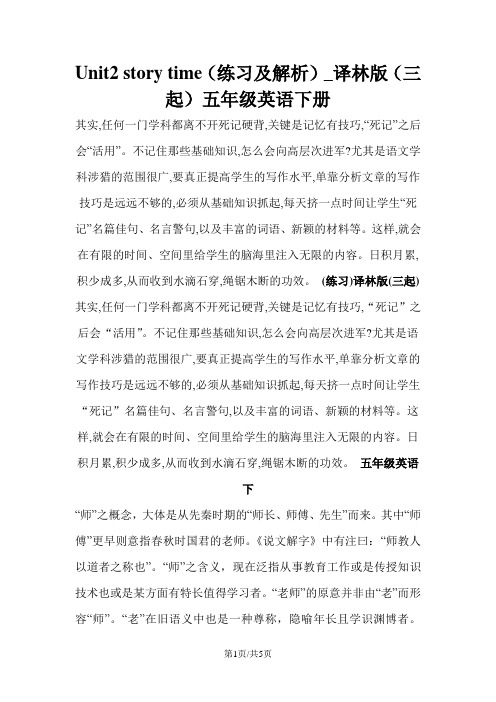
Unit2 story time(练习及解析)_译林版(三起)五年级英语下册其实,任何一门学科都离不开死记硬背,关键是记忆有技巧,“死记”之后会“活用”。
不记住那些基础知识,怎么会向高层次进军?尤其是语文学科涉猎的范围很广,要真正提高学生的写作水平,单靠分析文章的写作技巧是远远不够的,必须从基础知识抓起,每天挤一点时间让学生“死记”名篇佳句、名言警句,以及丰富的词语、新颖的材料等。
这样,就会在有限的时间、空间里给学生的脑海里注入无限的内容。
日积月累,积少成多,从而收到水滴石穿,绳锯木断的功效。
(练习)译林版(三起) 其实,任何一门学科都离不开死记硬背,关键是记忆有技巧,“死记”之后会“活用”。
不记住那些基础知识,怎么会向高层次进军?尤其是语文学科涉猎的范围很广,要真正提高学生的写作水平,单靠分析文章的写作技巧是远远不够的,必须从基础知识抓起,每天挤一点时间让学生“死记”名篇佳句、名言警句,以及丰富的词语、新颖的材料等。
这样,就会在有限的时间、空间里给学生的脑海里注入无限的内容。
日积月累,积少成多,从而收到水滴石穿,绳锯木断的功效。
五年级英语下“师”之概念,大体是从先秦时期的“师长、师傅、先生”而来。
其中“师傅”更早则意指春秋时国君的老师。
《说文解字》中有注曰:“师教人以道者之称也”。
“师”之含义,现在泛指从事教育工作或是传授知识技术也或是某方面有特长值得学习者。
“老师”的原意并非由“老”而形容“师”。
“老”在旧语义中也是一种尊称,隐喻年长且学识渊博者。
“老”“师”连用最初见于《史记》,有“荀卿最为老师”之说法。
慢慢“老师”之说也不再有年龄的限制,老少皆可适用。
只是司马迁笔下的“老师”当然不是今日意义上的“教师”,其只是“老”和“师”的复合构词,所表达的含义多指对知识渊博者的一种尊称,虽能从其身上学以“道”,但其不一定是知识的传播者。
今天看来,“教师”的必要条件不光是拥有知识,更重于传播知识。
一、翻译词组和句子。
【精品】译林版(三起)六年级英语下册Unit2 Story time试题及答案解析
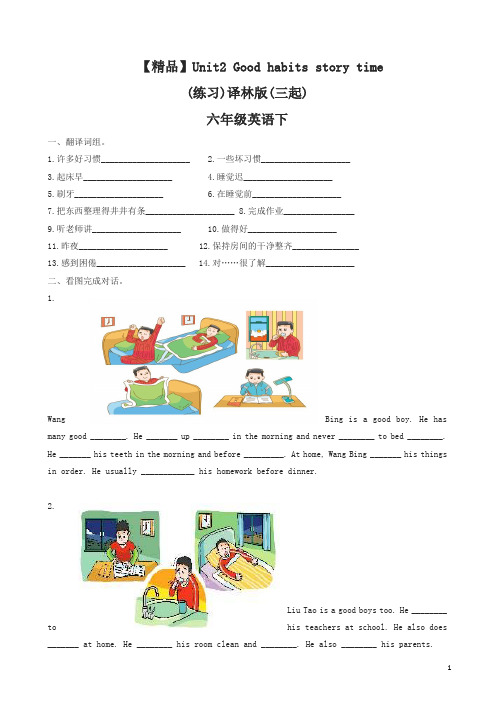
【精品】Unit2 Good habits story time(练习)译林版(三起)六年级英语下一、翻译词组。
1.许多好习惯____________________2.一些坏习惯____________________3.起床早____________________4.睡觉迟____________________5.刷牙____________________6.在睡觉前____________________7.把东西整理得井井有条____________________ 8.完成作业________________9.听老师讲____________________ 10.做得好____________________11.昨夜____________________ 12.保持房间的干净整齐_______________13.感到困倦____________________ 14.对……很了解____________________二、看图完成对话。
1.Wang Bing is a good boy. He has many good ________. He _______ up ________ in the morning and never ________ to bed ________. He _______ his teeth in the morning and before _________. At home, Wang Bing _______ his things in order. He usually ____________ his homework before dinner.2.Liu Tao is a good boys too. He ________ to his teachers at school. He also does _______ at home. He ________ his room clean and ________. He also ________ his parents.But Liu Tao has some bad habits. He often does his homework _______ at night and does not go to bed _________. He sometimes ________ ________ in the morning.3.Wang Bing and Liu Tao are friends. Wang Bing _______ Liu Tao ________.Wang Bing: Did you go to bed ______ last night, Liu Tao?Liu Tao: Yes, but I’m not sleep. I can ______ ________. Ouch !Wang Bing: You _______ go to bed ________, Liu Tao.三、单项选择。
Unit2 Story time (练习及解析)_译林版(三起)六年级英语上学期
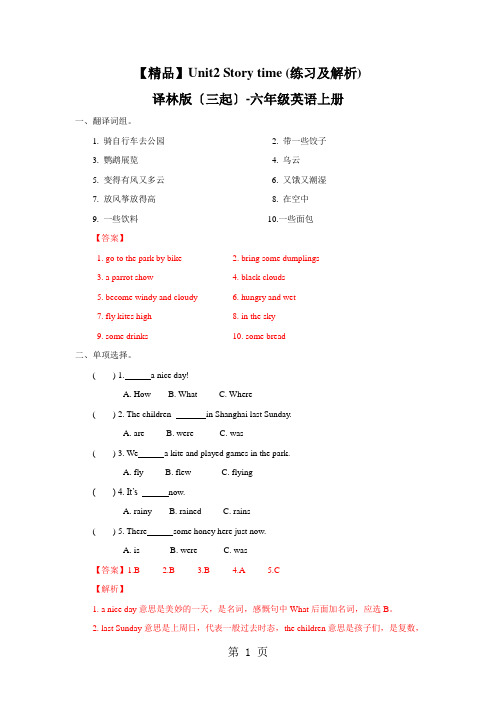
【精品】Unit2 Story time (练习及解析)译林版〔三起〕-六年级英语上册一、翻译词组。
1. 骑自行车去公园__________________2. 带一些饺子__________________3. 鹦鹉展览__________________4. 乌云__________________5. 变得有风又多云__________________6. 又饿又潮湿__________________7. 放风筝放得高__________________ 8. 在空中__________________9. 一些饮料__________________ 10.一些面包__________________【答案】1. go to the park by bike2. bring some dumplings3. a parrot show4. black clouds5. become windy and cloudy6. hungry and wet7. fly kites high 8. in the sky9. some drinks 10. some bread二、单项选择。
( ) 1. a nice day!A. HowB. WhatC. Where( ) 2. The children in Shanghai last Sunday.A. areB. wereC. was( ) 3. We a kite and played games in the park.A. flyB. flewC. flying( ) 4. It’s now.A. rainyB. rainedC. rains( ) 5. There some honey here just now.A. isB. wereC. was【答案】1.B 2.B 3.B 4.A 5.C【解析】1. a nice day意思是美妙的一天,是名词,感慨句中What后面加名词,应选B。
【精品】Unit2Storytime(练习及解析)译林版(三起)-三年级英语下(2021年整理)
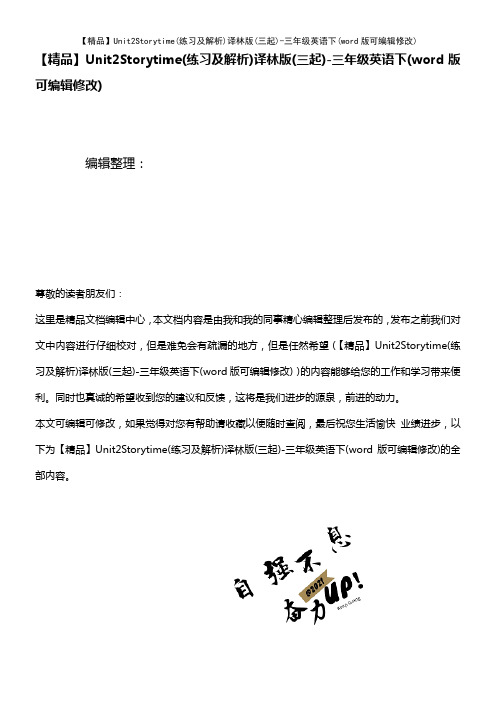
【精品】Unit2Storytime(练习及解析)译林版(三起)-三年级英语下(word版可编辑修改)编辑整理:尊敬的读者朋友们:这里是精品文档编辑中心,本文档内容是由我和我的同事精心编辑整理后发布的,发布之前我们对文中内容进行仔细校对,但是难免会有疏漏的地方,但是任然希望(【精品】Unit2Storytime(练习及解析)译林版(三起)-三年级英语下(word版可编辑修改))的内容能够给您的工作和学习带来便利。
同时也真诚的希望收到您的建议和反馈,这将是我们进步的源泉,前进的动力。
本文可编辑可修改,如果觉得对您有帮助请收藏以便随时查阅,最后祝您生活愉快业绩进步,以下为【精品】Unit2Storytime(练习及解析)译林版(三起)-三年级英语下(word版可编辑修改)的全部内容。
【精品】Unit2 In the library Story time(练习)译林版(三起)三年级英语下一、听录音,给下列句子排序。
() Don’t drink my milk。
( ) Would you like a pie?( ) I'm sorry.() Don’t shout。
( ) No, thank you.二、看图完成对话。
Liu Tao: Hello, Yang Ling !Yang Ling : Shh! _________ __________ , Liu Tao。
Yang Ling : ________ _________, Liu Tao。
Liu Tao: Would you like _________ __________ , Yang Ling ?Yang Ling : _______ , thank you。
Don’t _________ here.Liu Tao: Don’t_________。
Don’t _________。
Don’t _________.Yang Ling: Shh ! Don’t _________.Yang Ling: _______ ________ , Liu Tao. Liu Tao:_________ ________ 。
Unit2 Story time (练习及解析)_译林版(三起)六年级英语上册
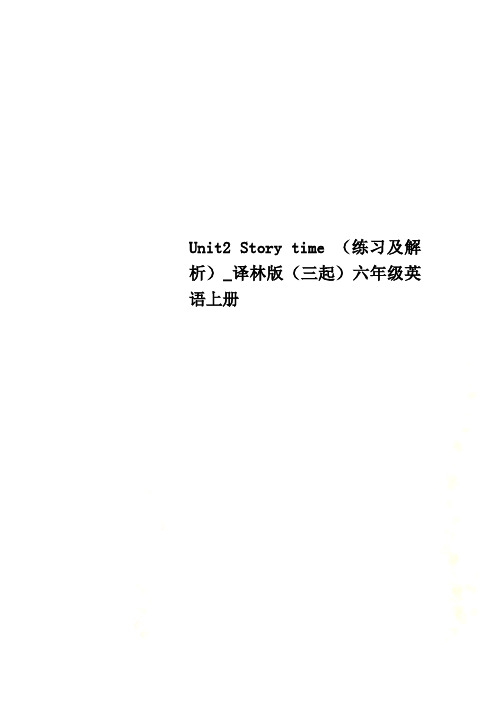
Unit2 Story time (练习及解析)_译林版(三起)六年级英语上册后面be动词用were,故选B。
3. 由句中的palyed可知是一般过去时态,and表示前后并列,fly的过去式是flew,故选B。
4. 由句中的be动词is可知,后面用形容词rainy,故选A。
5. just now代表一般过去时,some honey意思是一些蜂蜜,是不可数名词,be动词的过去式用was,故选C。
三、根据中文提示补全句子。
1.两小时前天气变得很晴朗。
The weather two hours ago. .2.小鸟在天空高高地飞着。
The birds are high in the .3.昨天早上有许多乌云。
There a lot of clouds yesterday morning.4.让我们去看鹦鹉展吧。
Let’s go and the parrots .5.请带些蜂蜜和饮料。
Please some honey and .【答案】1. became sunny 2. flying sky3. were black4. see show5. bring drinks四、选择合适的介词填空。
at on for1. I went to the park bike.2. There are some white clouds the sky.3. It was time dinner.4. We saw some red apples the tree.5. He pointed that nice picture.【答案】1. by 2. in 3. for 4. on5. at五、连词成句。
1. eat, our, we, breakfast, couldn’t (.)______________________________________________________2. brought, bread, they, some, and,drinks (.)______________________________________________________3. hungry, and, I, wet, was (.)______________________________________________________4. was, time, it, school, for (.)______________________________________________________5. day, an, what, interesting (!)______________________________________________________【答案】1. We couldn’t eat our breakfast.2. They brought some bread and drinks.3. I was hungry and wet.4. It was time for school.5. What an interesting day!六、阅读并判断,用T或F表示。
- 1、下载文档前请自行甄别文档内容的完整性,平台不提供额外的编辑、内容补充、找答案等附加服务。
- 2、"仅部分预览"的文档,不可在线预览部分如存在完整性等问题,可反馈申请退款(可完整预览的文档不适用该条件!)。
- 3、如文档侵犯您的权益,请联系客服反馈,我们会尽快为您处理(人工客服工作时间:9:00-18:30)。
【精品】Unit 2 How do you e to school ? Story time
(练习)译林版(三起)
五年级英语下
一、翻译词组和句子。
1.非常喜欢______________
2.离……远_____________
3.在月亮街______________
4.在市图书馆___________
5.在阳光小镇____________
6.在公园街_____________
7.乘公交车______________ 8.乘地铁_______________
9.乘出租车______________ 10步行________________
11.骑自行车_____________ 12.乘飞机______________
13.乘火车_______________ 14.乘轮船______________
15.你怎样来学校?
___________________________________
16.你住在哪里?
___________________________________
17.我的爸爸是一位出租车司机。
___________________________________
18.你喜欢你的新家吗?
___________________________________
二、看图补全对话。
Yang Ling: Do you like your _______ ________, Su Hai ?
Su Hai: Yes! It’s very big. I like it very much, but it’s ________ __________ school.
Yang Ling: _________ do you live now?
Su Hai: I _______ ________Moon Street, _________ City Library.
Yang Ling: _________ do you e to school ?
Su Hai: Su Yang and I e to school _________ __________.
Mike: ______ do you live, Yang Ling? ________ do you e to school ?
Yang Ling: I _______ _________school. I e to school ________ ________.
Where do you live?
Mike: I ________ ________Sunshine Town. I e to school _________ ___________. What about you , Liu Tao?
Liu Tao: I _______ ________Park Street. I e to school ________ ________.
My father is a _________ __________.
三、单项选择。
( )1.---________ do you live ?
---I live _______ Sunshine Town.
A. What , in
B. Where , in C . Where , on
( )2. ---__________do you e to school?
---I e to school _____foot.
A. Where, on
B. How, by C . How , on
( )3.---Does he ________on Moon Street?
--- Yes, he does.
A. lives
B. live C . living
( )4.---How ______ Liu Tao go to chool?
--- ______ taxi.
A. does, By
B. does, On C . do, By
( )5. ---How do you go to school?
---I live near school. I go to school ________
A. by car
B. by metro C . on foot
答案及解析:
一、1. like… very much 2. far from
3. on Moon Street
4. near City Library
5. in Sunshine Town
6. on Park Street
7. by bus 8. by metro
9. by taxi 10. on foot
11. by bike 12. by plane
13. by train 14. by ship
15. How do you e to school ?
16. Where do you live?
二、1. new home far from Where
live on near How by bus
2. Where How live near on foot
live in by metro live on
by taxi taxi driver
三、B C B A C
解析:
1.你居住在哪里?是用特殊疑问词Where 开头,即Where do you live? 居住在......城镇用live in ,
故选B。
2.你怎样来学校?是用特殊疑问词How开头,即How do you e to school? 步行是词组on foot.故
选C.
3.does是助动词,后面跟动词原形,三个选项中只有B选项是动词原形,故选B,意思是他住在
月亮街吗?是的。
4.Liu Tao是第三人称意思,对应的助动词用does,即How does Liu Tao go to chool? 乘出租车是by
taxi,故选A。
